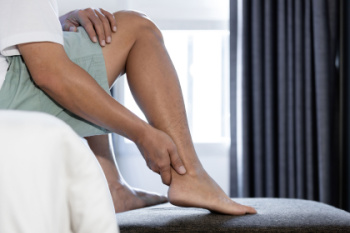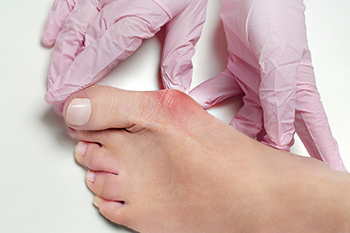Items filtered by date: August 2024
Managng Achilles Tendon Injuries

An Achilles tendon injury can be painful and limiting, affecting your ability to walk, run, or engage in daily activities. This strong tendon connects the calf muscles to the heel and plays a vital role in movements like walking, jumping, and climbing stairs. Achilles tendinitis, often caused by overuse, results in stiffness and pain in the back of the heel, which can worsen with activity. If left untreated, this condition can progress to Achilles tendinosis, leading to further degeneration of the tendon. In severe cases, an Achilles tendon rupture may occur, causing sudden, sharp pain and making it difficult to walk. While treatment options vary based on the severity of the Achilles tendon injury, a podiatrist can provide both non-surgical and surgical solutions tailored to your needs. These may include targeted exercises, custom orthotics, or surgery to repair a ruptured tendon. If you have incurred an Achilles tendon injury, it is suggested that you schedule an appointment with a podiatrist for a diagnosis and treatment.
Achilles tendon injuries need immediate attention to avoid future complications. If you have any concerns, contact Jack A. Sasiene, DPM of Texas. Our doctor can provide the care you need to keep you pain-free and on your feet.
What Is the Achilles Tendon?
The Achilles tendon is a tendon that connects the lower leg muscles and calf to the heel of the foot. It is the strongest tendon in the human body and is essential for making movement possible. Because this tendon is such an integral part of the body, any injuries to it can create immense difficulties and should immediately be presented to a doctor.
What Are the Symptoms of an Achilles Tendon Injury?
There are various types of injuries that can affect the Achilles tendon. The two most common injuries are Achilles tendinitis and ruptures of the tendon.
Achilles Tendinitis Symptoms
- Inflammation
- Dull to severe pain
- Increased blood flow to the tendon
- Thickening of the tendon
Rupture Symptoms
- Extreme pain and swelling in the foot
- Total immobility
Treatment and Prevention
Achilles tendon injuries are diagnosed by a thorough physical evaluation, which can include an MRI. Treatment involves rest, physical therapy, and in some cases, surgery. However, various preventative measures can be taken to avoid these injuries, such as:
- Thorough stretching of the tendon before and after exercise
- Strengthening exercises like calf raises, squats, leg curls, leg extensions, leg raises, lunges, and leg presses
If you have any questions please feel free to contact our offices located in Texas City and Lake Jackson, TX . We offer the newest diagnostic tools and technology to treat your foot and ankle needs.
Essential Ballet Foot Exercises

Ballet foot exercises are vital for warming up, enhancing technique, and building foot strength. Begin with simple foot stretches to improve flexibility and prepare the muscles for intense activity. Point and flex exercises, where you extend and retract your toes, can help to increase your range of motion and strength. Performing demi-pointe and full-pointe exercises strengthens the foot muscles and improves balance. Additionally, toe rises and relevés, where you lift onto the balls of your feet, contribute to greater control and stability. Incorporating resistance bands into your routine can further enhance strength and flexibility. If you have developed a foot condition from not warming up properly before practicing ballet moves, it is suggested that you confer with a podiatrist who can treat any foot condition, and guide you on practicing correct foot stretches.
Exercising your feet regularly with the proper foot wear is a great way to prevent injuries and build strength. If you have any concerns about your feet, contact Jack A. Sasiene, DPM from Texas. Our doctor can provide the care you need to keep you pain-free and on your feet.
Exercise for Your Feet
Exercise for your feet can help you gain strength, mobility and flexibility in your feet. They say that strengthening your feet can be just as rewarding as strengthening another part of the body. Your feet are very important, and we often forget about them in our daily tasks. But it is because of our feet that are we able to get going and do what we need to. For those of us fortunate enough to not have any foot problems, it is an important gesture to take care of them to ensure good health in the long run.
Some foot health exercises can include ankle pumps, tip-toeing, toe rises, lifting off the floor doing reps and sets, and flexing the toes. It is best to speak with Our doctor to determine an appropriate regimen for your needs. Everyone’s needs and bodies are different, and the activities required to maintain strength in the feet vary from individual to individual.
Once you get into a routine of doing regular exercise, you may notice a difference in your feet and how strong they may become.
If you have any questions please feel free to contact our offices located in Texas City and Lake Jackson, TX . We offer the newest diagnostic and treatment technologies for all your foot and ankle needs.
What Is Hallux Rigidus?
 Hallux rigidus is a form of degenerative arthritis affecting the joint at the base of the big toe. This condition leads to stiffness, pain, and limited movement in the toe, often making walking or other activities difficult. The primary cause of hallux rigidus is wear and tear of the cartilage in the joint, which can result from repetitive use, injury, or genetic predisposition. People at risk for hallux rigidus include those with a family history of the condition, athletes, or individuals whose activities put repeated stress on the big toe joint, such as dancers or certain laborers. Treatment options vary depending on the severity and can include non-surgical approaches like targeted stretching exercises, anti-inflammatory medications, and custom orthotics to reduce pressure on the toe. In more severe cases, surgery may be necessary to alleviate pain and restore mobility. If you have big toe pain, it is suggested that you schedule an appointment with a podiatrist for a proper diagnosis and treatment.
Hallux rigidus is a form of degenerative arthritis affecting the joint at the base of the big toe. This condition leads to stiffness, pain, and limited movement in the toe, often making walking or other activities difficult. The primary cause of hallux rigidus is wear and tear of the cartilage in the joint, which can result from repetitive use, injury, or genetic predisposition. People at risk for hallux rigidus include those with a family history of the condition, athletes, or individuals whose activities put repeated stress on the big toe joint, such as dancers or certain laborers. Treatment options vary depending on the severity and can include non-surgical approaches like targeted stretching exercises, anti-inflammatory medications, and custom orthotics to reduce pressure on the toe. In more severe cases, surgery may be necessary to alleviate pain and restore mobility. If you have big toe pain, it is suggested that you schedule an appointment with a podiatrist for a proper diagnosis and treatment.
Toe pain can disrupt your daily activities. If you have any concerns, contact Jack A. Sasiene, DPM of Texas. Our doctor can provide the care you need to keep you pain-free and on your feet.
What Causes Toe Pain?
Most severe toe pain is caused due to a sports injury, trauma from dropping something heavy on the toe, or bumping into something rigid. Other problems can develop over time for various reasons.
Toe pain can be caused by one or more ailments. The most common include:
- Trauma
- Sports injury
- Wearing shoes that are too tight
- Arthritis
- Gout
- Corns and calluses
- Hammertoe
- Bunions
- Blisters
- Ingrown toenails
- Sprains
- Fractures (broken bones)
- Dislocations
When to See a Podiatrist
- Severe pain
- Persistent pain that lasts more than a week
- Signs of infection
- Continued swelling
- Pain that prevents walking
Diagnosis
In many cases the cause of toe pain is obvious, but in others, a podiatrist may want to use more advanced methods to determine the problem. These can range from simple visual inspections and sensation tests to X-rays and MRI scans. Prior medical history, family medical history, and any recent physical traumatic events will all be taken into consideration for a proper diagnosis.
Treatment
Treatments for toe pain and injuries vary and may include shoe inserts, padding, taping, medicines, injections, and in some cases, surgery. If you believe that you have broken a toe, please see a podiatrist as soon as possible.
If you have any questions please feel free to contact our offices located in Texas City and Lake Jackson, TX . We offer the newest diagnostic tools and technology to treat your foot and ankle needs.
What Causes Foot Pain During Pregnancy?

Foot pain during pregnancy is common due to several factors. Weight gain places extra pressure on the feet, leading to arch collapse and overpronation. Hormonal changes cause ligaments to relax, affecting foot stability and contributing to conditions like plantar fasciitis or Achilles tendonitis. Swelling, or edema, increases discomfort, often affecting the feet and ankles due to fluid retention. To find relief, pregnant women can elevate their feet when possible to reduce swelling and wear supportive footwear with adequate arch support. Stretching exercises for the calves and plantar fascia can alleviate tension and strengthen muscles. Using compression socks or stockings can also help manage swelling. A podiatrist can diagnose causes of severe or persistent foot pain and ensure appropriate management throughout pregnancy. If you are experiencing foot pain during your pregnancy, it is suggested that you consult a podiatrist who can offer effective relief solutions.
Foot Pain
Foot pain can be extremely painful and debilitating. If you have a foot pain, consult with Jack A. Sasiene, DPM from Texas. Our doctor will assess your condition and provide you with quality foot and ankle treatment.
Causes
Foot pain is a very broad condition that could be caused by one or more ailments. The most common include:
- Bunions
- Hammertoes
- Plantar Fasciitis
- Bone Spurs
- Corns
- Tarsal Tunnel Syndrome
- Ingrown Toenails
- Arthritis (such as Gout, Rheumatoid, and Osteoarthritis)
- Flat Feet
- Injury (from stress fractures, broken toe, foot, ankle, Achilles tendon ruptures, and sprains)
- And more
Diagnosis
To figure out the cause of foot pain, podiatrists utilize several different methods. This can range from simple visual inspections and sensation tests to X-rays and MRI scans. Prior medical history, family medical history, and any recent physical traumatic events will all be taken into consideration for a proper diagnosis.
Treatment
Treatment depends upon the cause of the foot pain. Whether it is resting, staying off the foot, or having surgery; podiatrists have a number of treatment options available for foot pain.
If you have any questions, please feel free to contact our offices located in Texas City and Lake Jackson, TX . We offer the newest diagnostic and treatment technologies for all your foot care needs.

